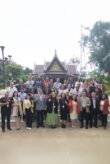On 29 April, PTB’s Asia Section and the ConnectingAsia Programme of Polis180, a Berlin-based grassroots thinktank, jointly facilitated an online panel discussion about the Regional Comprehensive Economic Partnership (RCEP) in Asia.
The aim of the event was to consider whether the benefits of RCEP would trickle down to the least developed, low or lower middle-income countries in the region, and how small and medium-size enterprises (SMEs), as the powerhouse of economic development in the region, could reap the benefit of expected trade gains.
A wide audience from Europe, Asia, and other parts of the world heard opening statements from Dr Deborah Elms, Founder and Executive Director, Asian Trade Centre (Singapore); Dr Yose Rizal Damuri, Head of the Department of Economics, Center for Strategic and International Studies (Jakarta); and Dr Axel Berger, Senior Researcher, German Development Institute (Bonn) before an open Q&A session during which searching questions were answered by the panel speakers.
The free trade agreement was signed between 15 Asia-Pacific nations in November 2020 and is expected to become the largest preferential trade agreement by economic output in the world. It will cover approximately 30% of the world’s population and 30% of global GDP. The agreement is expected to come into force within 2 years once ratified by at least 6 of the ASEAN signatories and 3 of the non-ASEAN signatories.
RCEP consolidates existing bilateral and multilateral trade agreements and builds on both the existing trade agreement for the ASEAN Free Trade Area (AFTA) and measures to implement the WTO TBT Agreement. Importantly, it establishes a free trade agreement for the first time between China and Japan, and Japan and South Korea.
The discussions tended towards the view that the larger and more developed countries might end up as the biggest trade winners from RCEP along with those other countries that are heavily involved in regional value chains. The cost of compliance may be too high for SMEs to benefit from such a trade agreement without external assistance, and the least developed countries were likely to continue to need development support to ensure that they too may enjoy the benefits of RCEP. However, one opinion was that AFTA signatories would be very unlikely to want to pull out of membership of an expanded trade bloc.
One of the biggest benefits identified during the discussions was the introduction of simpler and standardised rules of origin for trade – even though some of the timescales for their introduction and tariff-free trade will take many years.
The panel identified and discussed some important areas that are not included within the current wording of RCEP (labour and workers’ rights, environmental provisions, subsidies and state-owned enterprises) but concluded that these may yet be considered at some stage in the future.
The Asian Development Bank has described micro, small and medium-sized enterprises (MSMEs) as the “backbone of Asia’s economy” as throughout the last decade, MSMEs accounted for an average of 69 % of the total workforce and 41 % of the gross domestic product (GDP) in Southeast Asia (source: Asia Small and Medium-Sized Enterprise Monitor 2020). Panellists believed that many SMEs have no access to international markets unless it is through agreements such as RCEP; the emphasis of RCEP in supporting regional value chains was therefore thought to be positive.
Contemplating the impact on future development cooperation within the region, the view was that whilst considerable funding support has already been channelled to countries such as Cambodia, Lao PDR and Myanmar, there was still the need and scope for development aid and capacity building in addition to the programmes that are already provided. From experience, trade agreements such as RCEP do not cover all of the areas where least developed countries need help even though they help SMEs connect to supply chains. Streamlining and improving the Quality Infrastructures was considered important, and here the least developed countries were again highlighted as needing on-going support.
Whilst RCEP is often seen as an extension to the coverage of the ASEAN Free Trade Area and has been considered to be less ambitious than other free trade agreements, it is still expected to generate significant trade gains for signatories. It is considered a great achievement after many years of negotiation – it is now at the start of a longer journey of implementation.
Image © shutterstock








